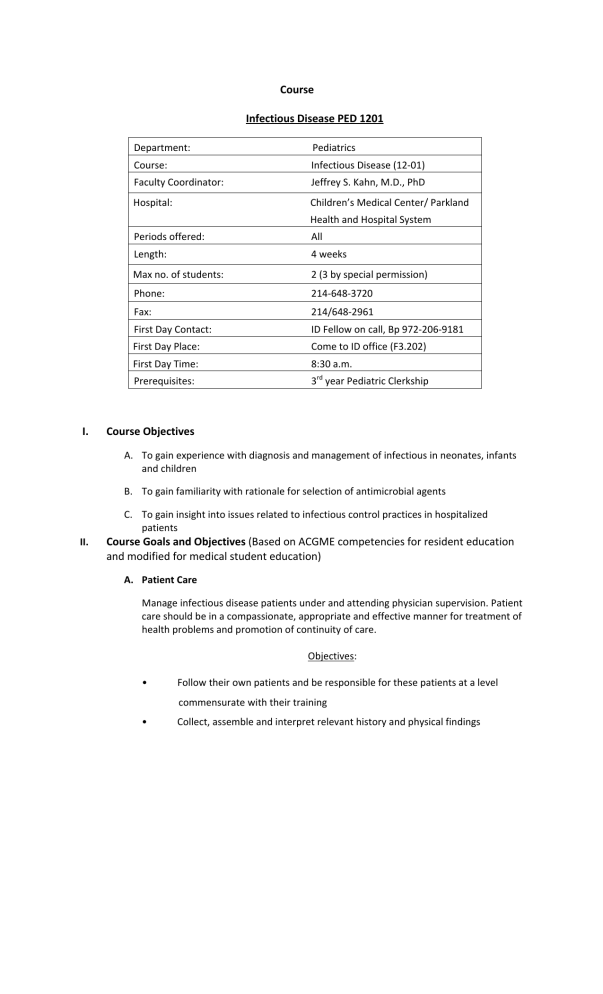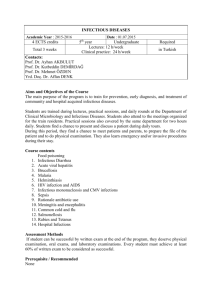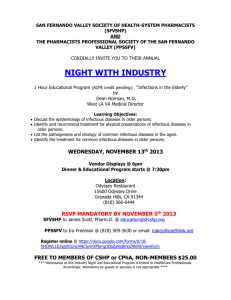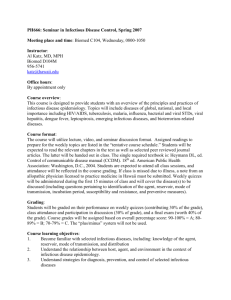Course Infectious Disease PED 1201

Department:
Course:
Faculty Coordinator:
Course
Infectious
Disease
PED
1201
Pediatrics
Infectious Disease (12 ‐ 01)
Jeffrey S.
Kahn, M.D., PhD
Hospital:
Periods offered:
Length:
Max no.
of students:
Phone:
Fax:
First Day Contact:
First Day Place:
First Day Time:
Prerequisites:
Children’s Medical Center/ Parkland
Health and Hospital System
All
4 weeks
2 (3 by special permission)
214 ‐ 648 ‐ 3720
214/648 ‐ 2961
ID Fellow on call, Bp 972 ‐ 206 ‐ 9181
Come to ID office (F3.202)
8:30 a.m.
3 rd
year Pediatric Clerkship
I.
Course
Objectives
A.
To gain experience with diagnosis and management of infectious in neonates, infants and children
II.
B.
To gain familiarity with rationale for selection of antimicrobial agents
C.
To gain insight into issues related to infectious control practices in hospitalized patients
Course
Goals
and
Objectives
(Based
on
ACGME
competencies
for
resident
education
and
modified
for
medical
student
education)
A.
Patient Care
Manage infectious disease patients under and attending physician supervision.
Patient care should be in a compassionate, appropriate and effective manner for treatment of health problems and promotion of continuity of care.
Objectives:
• Follow their own patients and be responsible for these patients at a level
commensurate with their training
• Collect, assemble and interpret relevant history and physical findings
•
•
Create and maintain complete and accurate medical records
Evaluate diagnostic studies pertinent to the infectious disease patient
•
•
Participate in the management of the patient’s problem in the hospital
Communicate with the other health care professionals and referring
physicians
B.
Medical Knowledge
Become familiar with the major pediatric diagnoses requiring hospital care and infectious disease consultation, which promote the development of clinical problem ‐ solving skills.
Objectives:
• Demonstrate knowledge that would allow for independent assessment and
appropriate problem solving skills of hospitalized pediatric patients
• Demonstrate knowledge in the management of inpatients with infectious
diseases
C.
Practice ‐ Base Learning and Improvement
Students must be able to assimilate scientific evidence to improve their patient care practices.
Objectives:
• Demonstrate proper evidence based decisions
•
Demonstrate appropriate use of educational resources for self
including medical literature and on ‐ line medical information
‐ education,
D.
Interpersonal and Communication Skills
Students must be able to demonstrate interpersonal and communication skills that results in effective information exchange with healthcare professionals and families.
Objectives:
•
•
Give case presentations in a clear, concise, organized and relevant
Communicate appropriate information to the family (and patient)
manner
concerning management and clinical course
• Be an integral member of the medical care team and exchange information
effectively with other health care professionals
E.
Professionalism
Students must demonstrate attitudes and professional behavior appropriate for clinical practice, which encompass professional responsibilities, adherence to ethical principles and sensitivity to diverse patient populations.
Objectives:
•
•
•
•
•
Accurate representation of data
Ethically sound decisions
Professional appearance
On time attendance at rounds and conferences
Respect for patients’ confidentiality
•
•
Mature behavior
Sensitivity to culture, genders and disabilities
III.
Methods
of
Instruction
A.
Didactic (schedule, topic, faculty)
• Structured conferences 2 ‐ 3 times weekly with ID fellows on infectious
disease topics
• Attend seminar and conference presentations
• Faculty staff includes, Jeffrey Kahn, George H.
McCracken, Jr., Monica
Ardura, Theresa Barton, Carla Garcia, Michelle A.
Gill, Jeffrey McKinney,
Pablo J.
Sanchez and Jane D.
Siegel
B.
Clinical (schedule, faculty teaching, house ‐ staff teaching)
• Daily consultation rounds with faculty, residents and fellows
• Weekly seminar, follow ‐ up rounds
•
•
•
Daily intake conference at Children’s (optional)
Noon conference at Children’s (optional)
Bi ‐ weekly City ‐ Wide Infectious Disease Conference
C.
Student responsibilities (and to whom accountable)
• Student spends morning working ‐ up case(s) for presentation at Infectious
Disease rounds.
• Infectious Disease rounds are at 10:00 am on Tuesdays, Thursdays, and
Fridays; 1:00 pm on Mondays; 9:30 am on Wednesdays.
An ID fellow
is available to student at all times
IV.
•
•
Assigned reading on selected topics
No night call or weekend responsibilities
Method
of
evaluation
of
student
• During the rotation, the attending faculty member discusses the student’s
performance with him or her
• Students receive an online evaluation of their weekly performance, which
they must acknowledge, by logging into an online system to review



